The UK government has reportedly issued a legal demand to access encrypted data stored by Apple users worldwide on its iCloud service, raising serious privacy and cybersecurity concerns.
Currently, only Apple account holders can access their encrypted cloud data, as even Apple itself cannot view it. However, under the Investigatory Powers Act (IPA), the UK Home Office has served a notice requiring access to this protected information.
Due to legal restrictions, the order cannot be publicly disclosed, and Apple has declined to comment. The Washington Post was the first to report the story, citing sources familiar with the matter, which has since been corroborated by the BBC.
A Home Office spokesperson stated: “We do not comment on operational matters, including for example confirming or denying the existence of any such notices.”
What Does This Mean for Apple Users?
The notice targets all data stored under Apple’s Advanced Data Protection (ADP) feature, which provides end-to-end encryption. This opt-in security measure ensures that even Apple cannot retrieve lost user data.
However, the UK government has long criticised encryption for allowing criminals to conceal illicit activity. Similar concerns have been raised in the United States, with the FBI previously criticising Apple’s ADP tool.
Apple’s Stand Against Government Surveillance
Apple has strongly opposed weakening its security systems, warning it could withdraw encryption services from the UK market rather than comply with demands to create “back doors” for government access.
Cybersecurity experts caution that introducing such a vulnerability would not only grant authorities access but could also be exploited by hackers and cybercriminals.
However, avoiding compliance may not be straightforward. The IPA applies globally, meaning that even tech firms operating outside the UK but serving British users must comply.
While Apple can appeal the decision, the law states that it must still implement the ruling immediately, even if it is later overturned.
Experts and Privacy Campaigners React
The government’s demand has sparked widespread criticism from cybersecurity professionals and civil liberties organisations.
Professor Alan Woodward, a cybersecurity expert at the University of Surrey, expressed his shock, while Big Brother Watch called the move “troubling,” stating:
“This misguided attempt at tackling crime and terrorism will not make the UK safer but will erode the fundamental rights and civil liberties of the entire population.”
However, some child protection groups, including the NSPCC, have backed the government’s stance, arguing that encryption can shield predators sharing illegal content.
Will This Measure Be Effective?
Experts remain sceptical about whether the government’s actions will actually deter criminals. Lisa Forte, a cybersecurity expert at Red Goat, argued:
“Criminals and terrorists will just pivot to other platforms and techniques to avoid incrimination. So it’s the average, law-abiding citizen who suffers by losing their privacy.”
A Growing Global Battle Over Digital Privacy
Apple has previously challenged proposed amendments to the IPA, describing them as an “unprecedented overreach” by the UK government.
These changes, which have since been passed into law, grant ministers the power to veto new security features before their implementation.
As the debate over encryption and government surveillance intensifies, Apple’s next move will be closely watched, with the outcome potentially setting a precedent for digital privacy worldwide.


